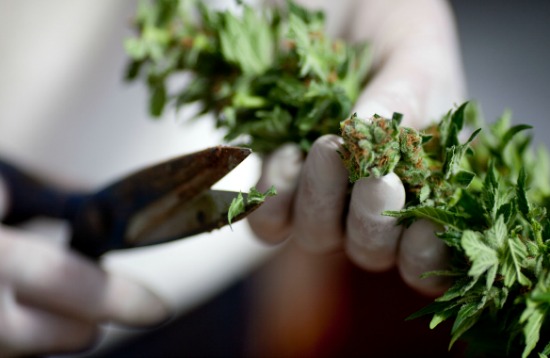A lthough the federal government continues to rank marijuana as one of the most dangerous drugs, efforts to legalize it – for both recreational and medical use – have been percolating on the state level for the past decade. A new PRRI/RNS Religion News Survey shows that Americans are divided on whether marijuana should be legal (45 percent favor, 49 oppose). With the exception of white mainline Protestants, who, like the general public, are divided, majorities of most other major religious groups oppose the legalization of marijuana.
However, these overall findings eclipse the generational changes that are forging rifts between younger and older Christians on the legality and morality of marijuana use. In fact, the recent survey shows that holding a range of other attributes constant, age is a stronger predictor then religious affiliation of attitudes toward the legalization and morality of marijuana use.
In the general population, the generational divides are yawning. Young adults (age 18-29) are more than twice as likely as seniors (age 65 and older) to agree that marijuana should be legal (54 percent vs. 28 percent), and this rift is having a distinct impact on attitudes in Christian pews. For example, while half (50 percent) of Christian young adults believe that marijuana use should be legal, only approximately 1-in-5 (22 percent) Christian seniors agree. Similarly, Christian young adults (52 percent) are more than twice as likely as Christian seniors (25 percent) to say that the use of marijuana is morally acceptable. And although a majority (54 percent) of Christian seniors believe that new laws legalizing the use of marijuana are a sign of America’s moral decline, only 3-in-10 (30 percent) Christian young adults hold this view, while two-thirds (67 percent) disagree.
Part of this divide is related to personal experience with marijuana. The survey found that Americans who say they have tried marijuana at some point in their lives are significantly more likely than those who have not to favor legalization of the drug. Reported marijuana usage among Christian young adults (45 percent) is not significantly different from the general population (42 percent), but it is three times the frequency reported by Christian seniors (13 percent). The divide may also have a theological basis. Christian seniors are nearly twice as likely as Christian young adults to believe both that using marijuana is a sin (34 percent vs. 18 percent respectively) and that the Bible prohibits marijuana use (24 percent vs. 13 percent respectively).
Like same-sex marriage, the legalization of marijuana has moved from an outlier issue just a decade ago to a mainstream issue today. As more states debate the legalization of marijuana, the data suggest that this issue is not likely to be at the forefront of the culture wars. Young Christians’ support for marijuana legalization points to an tectonic generational shift that will likely reshape not only whether the use of marijuana is legal but whether it is categorized as a substance more akin to alcohol or as a dangerous Schedule I drug.
Dr. Robert P. Jones is the founding CEO of Public Religion Research Institute, a nonprofit, nonpartisan organization conducting research at the intersection of religion, values, and public life.
